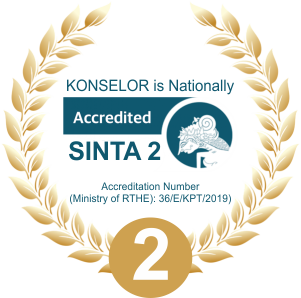Learning during covid-19 at elementary schools in Indonesia
 ), Sunardi Sunardi(3),
), Sunardi Sunardi(3), (1) Universitas Pendidikan Indonesia
(2) Universitas Pendidikan Indonesia
(3) Universitas Pendidikan Indonesia
 Corresponding Author
Corresponding Author
Copyright (c) 2021 Tryastuti Irawati Belliny Manullang, Endang Rochyadi, Sunardi Sunardi
DOI : https://doi.org/10.24036/02021102111400-0-00
Full Text:
 Language : en
Language : en
Abstract
The COVID-19 pandemic occurred in Indonesia in early March 2020 which was then followed by learning from home policy. The purpose of this study is to gather information through a survey about the implementation of online learning conducted by teachers who provide inclusive education service at the elementary schools. This study uses a descriptive qualitative approach. The data collected by using a survey technique and then a descriptive analysis is conducted with a total of 80 respondents who are scattered in several provinces in Indonesia. The results show that teachers' knowledge of COVID-19 needs improvement and a few teachers still believe that COVID-19 is a conspiracy. The learning process during the COVID-19 pandemic has made teachers make changes in the teaching and learning process, but not all teachers use television programs as a medium of learning. The ability of teachers to use ICT helps them in providing educational services and the majority have no difficulty using learning applications. Although at the beginning of the pandemic, it was difficult to adapt to learning, until this article is written the teachers have been adapting their teaching approaches. It is also found that teachers have a good relationship with parents and teachers fully aware that the success of distance learning lay in the involvement of parents.
Keywords
References
Aka, K. A. (2017). Pemanfaatan Teknologi Informasi Dan Komunikasi (TIK) Sebagai Wujud Inovasi Sumber Belajar Di Sekolah Dasar. ELSE (Elementary School Education Journal): Jurnal Pendidikan Dan Pembelajaran Sekolah Dasar, 1(2a).
Bakhshi, P., Taff, S., Trani, J-F., & Kaplan, I. (2020). Inclusion in education: A very useful crisis. UNESCO Futures of Education Ideas LAB. Retrieved from https://en.unesco.org/futuresofeducation/ideas-lab/inclusion-education-very-useful-crisis. (accessed 25 June 2020).
Braunsteiner, M. L., & Mariano-Lapidus, S. (2014). A perspective of inclusion: Challenges for the future.Global Education Review, 1(1), 32-43.
Budiyanto. (2009). Modul Training of Trainers Pendidikan Inklusif. Departemen Pendidikan Nasional. Jakarta. [Modul Training of Trainers Inclusive Education. Ministry of Education. Inclusive Education Training of Trainers Module]. Jakarta.
Burgess, S., Sievertsen, H.S. (2020). Schools, skills, and learning: The impact of COVID-19 on education. Available in https://voxeu.org/article/impact-covid-19-education. (accessed 25 June 2020).
Cui, J., Li, F., & Shi, Z. L. (2019). Origin and evolution of pathogenic coronaviruses. Nature Reviews Microbiology, 17(3),81-192. doi:.1038/s41579-018-0118-9.
de Rosari, D., & Saepudin, A. (2018). Munculnya Resolusi Wha (World Health Assembly) No. 64/56 Dalam Kerjasama Penanganan Pandemi Influenza Dengan Kerangka Gisrs (Global In Uenza Surveillance And Respon System) Who. Paradigma, 17, (2). doi:10.31315/paradigma.v17i2.2424
Global Education Monitoring Report. (2020). UNESCO.
Georgiou, N., Delfabbro, P., & Balzan, R. (2020). COVID-19-related conspiracy beliefs and their relationship with perceived stress and pre-existing conspiracy beliefs. Personality and individual differences, vol.166, 10201. doi: 10.1016/j.paid.2020.110201.
Gunawan, I. (2013). Metode Penelitian Kualitatif: Teori dan Praktik. [Qualitative Research Methods: Theory and Practice]. Jakarta: PT. Bumi Aksara
Gunawan, I. G. D. (2020). Transformasi Televisi Sebagai Masa Pandemi Covid-19. In I Ketut Sudarsana et al. COVID-19: Perspektif Pendidikan. Indonesia: Yayasan Kita Menulis, pp.80-84.
Kementerian Pendidikan dan Kebudayaan. (2017). Pusat Data dan Statistik Pendidikan dan Kebudayaan. Indonesia Centre for Data and Statistics on Education and Culture, Jakarta.
Lestari, P. A. S., & Gunawan, G. (2020). The Impact of Covid-19 Pandemic on Learning Implementation of Primary and Secondary School Levels. Indonesian Journal of Elementary and Childhood Education, 1(2), 58-63.
Morawska, L., Tang, J. W., Bahnfleth, W., Bluyssen, P. M., Boerstra, A., Buonanno, G., ... & Haworth, C. (2020). How can airborne transmission of COVID-19 indoors be minimised? Environment international, vol.142, 105832. doi: 10.1016/j.envint.2020.105832.
O’Hanlon, C. (2003). Educational Inclusion as Action Research: An interpretive discourse. Berkshire: England. Open University Press.
Ranscombe, P. (2020). Rural areas at risk during COVID-19 pandemic. The Lancet, 20(5), 545. doi:10.1016/ S1473-3099(20)30301-7.
Rong, X., Yang, L., Chu, H., & Fan, M. (2020). Effect of delay in diagnosis on transmission of COVID-19. Mathematical Biosciences and Engineering, 17(3), 2725-2740. doi: 10.3934/mb3.2020149
Sun, J., He, W. T., Wang, L., Lai, A., Ji, X., Zhai, X., ... & Veit, M. (2020). COVID-19: epidemiology, evolution, and cross-disciplinary perspectives. Trends in Molecular Medicine, 5(5), 483-495. doi: 10.1016/j.molmed.2020.02.008
Sunardi, Sunaryo. (2011). Manajemen Pendidikan Inklusif: Konsep, Kebijakan dan Implementasinya. JASISAnakku, 10(2),184-200.
Surat Edaran Kementerian Pendidikan dan Kebudayaan Nomor 4 Tahun 2020. Pelaksanaan Kebijakan Pendidikan Dalam Masa Darurat Penyebaran Coronavirus Disease (COVID-19). [Implementation of Education Policies in an Emergency for the Spread of Coronavirus Disease (COVID-19)].
Tosepu, R., Gunawan, J., Effendy, D. S., Lestari, H., Bahar, H., & Asfian, P. (2020). Correlation between weather and Covid-19 pandemic in Jakarta, Indonesia. Science of The Total Environment, 138436. doi: 10.1016/j.scitotenv.2020.138436.
Undang-Undang Nomor 24 tahun 2007. Penanggulangan Bencana. [Disaster Management].
Wilson, N., Corbett, S., & Tovey, E. (2020). Airborne transmission of COVID-19. The BMJ, 370. doi:10.1136/bmj.m3206
 Article Metrics
Article Metrics
 Abstract Views : 594 times
Abstract Views : 594 times
 PDF Downloaded : 82 times
PDF Downloaded : 82 times
Refbacks
- There are currently no refbacks.
Copyright (c) 2021 Tryastuti Irawati Belliny Manullang, Endang Rochyadi, Sunardi Sunardi

This work is licensed under a Creative Commons Attribution 4.0 International License.







